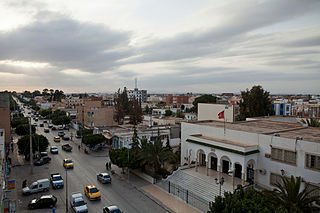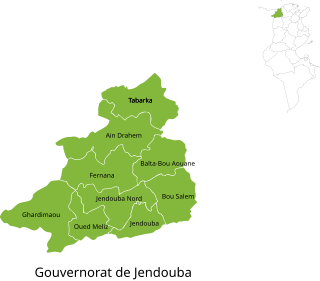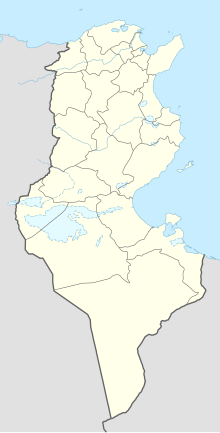
The Tunisian Football Federation is the governing body of football in Tunisia. It established on 29 March 1957. It became a member in the FIFA in 1960, and in the same year it also became a member of CAF association. The federation also joined the UAFA in 1976 and the UNAF in 2005. It organises the football league, the Tunisian Ligue Professionnelle 1, the Tunisia national football team and the Tunisia women's national football team. It is based in Tunis.

Sidi Bouzid, sometimes called Sidi Bou Zid or Sīdī Bū Zayd, is a city in Tunisia and is the capital of Sidi Bouzid Governorate in the centre of the country. Following the suicide of Mohamed Bouazizi in Sidi Bouzid, it was the site of the first clashes of the Tunisian Revolution and a catalyst for other protests in the region, often known as the Arab Spring.

Hammam Sousse is a coastal town in eastern Tunisia. It is located north of Sousse. It has about 42,691 inhabitants in 2014.

Jendouba Governorate is one of the twenty-four governorates of Tunisia. It is predominantly in the high hills of the Tell Atlas in north-western Tunisia, bordering Algeria and the Mediterranean Sea. It covers an area of 3,102 km2 (1,198 sq mi) and has a population of 401,477. The capital is Jendouba.
Tabarka–Aïn Draham International Airport, formerly Tabarka–7 November International Airport, is a public sector airport serving Tabarka in Tunisia.

Presidential elections were held in Tunisia on 23 November 2014, a month after parliamentary elections. They were the first free and fair presidential elections since the country gained independence in 1956, and the first direct presidential elections after the Tunisian Revolution of 2011 and the adoption of a new Constitution in January 2014.
The mass media in Tunisia is an economic sector. Under the authoritarian regimes of Habib Bourguiba, and then Zine El Abidine Ben Ali, it saw periods of liberalization and then challenges, notably due to Tunisian censorship. The 2010-2011 Tunisian protests and the subsequent change in government may bring significant change in this domain.

Mohamed Brahmi was a Tunisian politician. Brahmi was the founder and former leader of the People's Movement, which, under his leadership, won two seats in the constituent election in 2011.
Majdouline Cherni is a Tunisian architect and politician who was Minister of Youth and Sports from 2016 to 2018.

The Soliman shooting was a shootout that occurred on January 3, 2007 in the Tunisian region of Soliman, south-east of Tunis. The national police forces fought an armed group calling itself "Asad ibn al-Furat's army" which had been initially labeled by the government as "dangerous criminals". A previous shooting involving this same group had taken place on December 23, 2006, placing it in a context of jihadist terrorism and anarchist, insurgent, Islamist militancy.

The Raoued operation was an anti-terrorist operation that was conducted in February 2014 in Raoued, Tunisia against Salafist extremists.

Parliamentary elections were held in Tunisia on 17 December 2022 to elect the third Assembly of the Representatives of the People. Run-offs were held on 29 January 2023 in the vast majority of constituencies after only 21 candidates were elected in the first round.

An ongoing war and civil conflict between the Government of Burkina Faso and Islamist rebels began in August 2015 and has led to the displacement of over 2 million people and the deaths of at least 10,000 civilians and combatants.

A constitutional referendum was held in Tunisia on 25 July 2022 by the Independent High Authority for Elections. The referendum was supported by the Tunisian president, Kais Saied, one year into a political crisis that began on 25 July 2021. The referendum was preceded by an electronic consultation regarding the nature of the political system and the method of voting in legislative elections. It was boycotted by many of Tunisia's largest political parties.
Aymen Sfaxi is a Tunisian professional footballer who plays as right winger for Egyptian Premier League Future FC. He previously played for Étoile Sportive du Sahel.
The Battle of Touayel is a confrontation between Tunisian law enforcement forces and jihadists that took place in Tunisia in October 2013.
Khemais Chammari was a Tunisian human rights activist, diplomat, and politician of the Movement of Socialist Democrats (MDS). He was sentenced to prison many times by the regime of Zine El Abidine Ben Ali.

The Constitution of the Republic of Tunisia 2022, or the Third Republic Constitution, is the current constitution of Tunisia that was adopted in Tunisia on 25 July 2022 after the voters approved the constitutional referendum that was held on the same day.

Karim Gharbi, better known by his stage name K2Rhym, is a Tunisian rapper, producer and politician.












